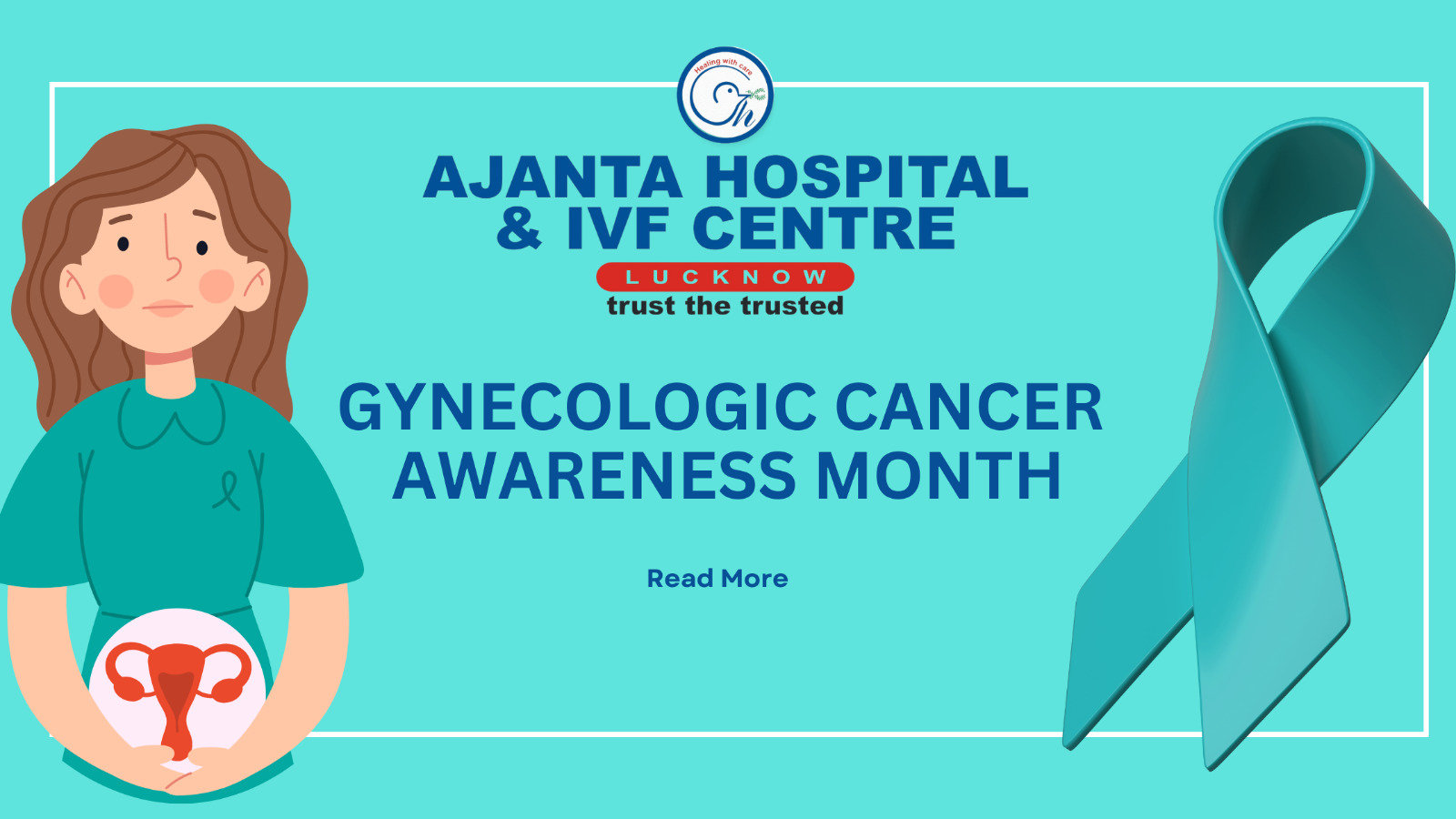Gynecologic Cancer Awareness Month: Awareness Refresh, Action, Prevention By Ajanta Hospital and IVF Centre – Lucknow's Leading Multi-Specialty Hospital
Each September, Gynecologic Cancer Awareness Month brings focus to the female reproductive tract's cancers, including ovarian, cervical, uterine, vaginal, and vulvar cancers. Since these are not typically discovered until well along in their development, awareness, earlier detection, and prevention thereafter become critical. We merit being the best hospital in Lucknow and a trustworthy healthcare service provider in women's health and fertility sectors. Patient education and patient care assistance at all stages of patient health are our priorities.
Understanding Gynecologic Cancers
Female reproductive organ cancer and gynecologic cancer have some of the same therapeutic and diagnostic features. Ovarian cancer, or the "silent killer," is virtually undiagnosable when in its early stage since its symptoms and signs are nonspecific and can be bloating abdominal pain, and weight gain.
HPV infection is primarily the cause of cervical cancer, which is nearly symptomless in the end stage. Pap smear and HPV tests need to be conducted periodically to prevent the disease.
Endometrial or postmenopausal cancer is most commonly detected by irregular vaginal discharge or postmenopausal bleeding. Vulvar and vaginal cancers are not common but have to be diagnosed as well since they present signs such as itching, painful or uncharacteristic vaginal bleeding, or burning over the lesion site.
Importance of Early Detection and Screening
Treatment of gynecologic cancer is much better if the disease is diagnosed at an early stage. Screening tests regularly like Pap smears and HPV testing need to be performed to detect cervical cancer as well as cervical precancerous cell changes. Moreover, awareness of genetic risk—e.g., family history or BRCA1 or BRCA2 mutation—can detect high-risk individuals for ovarian and uterine cancer. Early screening and tests, so important to early detection of gynecologic cancers, are guaranteed through regular check-ups and unlimited access to information from health care providers.
Prevention Strategies
Prevention of certain gynecologic cancers is not preventable, but some types of prevention can avert such events. Women between 21 and 65 years of age should get screened with Pap tests and HPV tests periodically for early diagnosis of cervical cancer. HPV vaccine is a highly protective measure against cervical cancer, and it needs to be taken by the subject in the age group 9 to 26 years. Healthy eating, physical activity, and no tobacco result in a healthy lifestyle and eliminate gynecologic cancers. Those who have a personal or family history of gynecologic cancers avoid gynecologic cancers using genetic testing and evaluation to identify their risk factors and guide interventions.
Advanced Treatment Options at Ajanta Hospital
Ajanta Hospital and IVF Centre, the premier multispecialty hospital in the city, has the best gynecologic cancer treatment. We offer the latest minimally invasive surgical procedures such as laparoscopic and robotic surgeries that allow for faster recoveries and optimal results. Our well-educated professionals also give chemotherapy and radiation therapy according to each patient's individual needs. We are specialists in creating custom care plans along with referring gynecologists and oncologists to deliver the best possible treatments.
Raising Awareness During Gynecologic Cancer Awareness Month
Gynecologic Cancer Awareness Month is all about prevention, education, and early detection saving lives. People can initiate the process of receiving proper treatment in time by staying watchful about symptoms such as abnormal vaginal bleeding, chronic pelvic pain, or unexplained weight gain. Pap tests and HPV tests always need to be done in time as early detection results in positive outcomes. It is also required to encourage HPV vaccination of youth to prevent cervical cancer in the future. Finally, education among loved ones raises awareness to encourage an environment conducive to early prevention and detection.
Your Health Matters
We at Ajanta Hospital are committed to empowering individuals with the information that will enable them to take charge of their health. We are here to support you every step of the way, whether it entails screenings, innovative treatments, or preventive advice.
Contact Us for Liver Health Check-ups
For further details regarding liver health check-ups or to book an appointment, kindly get in touch with us at:
Ajanta Hospital & IVF Centre
Phone: 0522-4032888, 7991606002, 7991606003
Email: support@ajantahospital.com
Website: www.ajantahospital-ivfcentre.com
#GynecologicCancerAwareness #LucknowDoctors #CancerAwarenessMonth
#GynecologistInLucknow #WomensHealthLucknow #OvarianCancerAwareness
#VulvarCancerAwareness #HPVVaccine #CancerPrevention #CancerSupport






